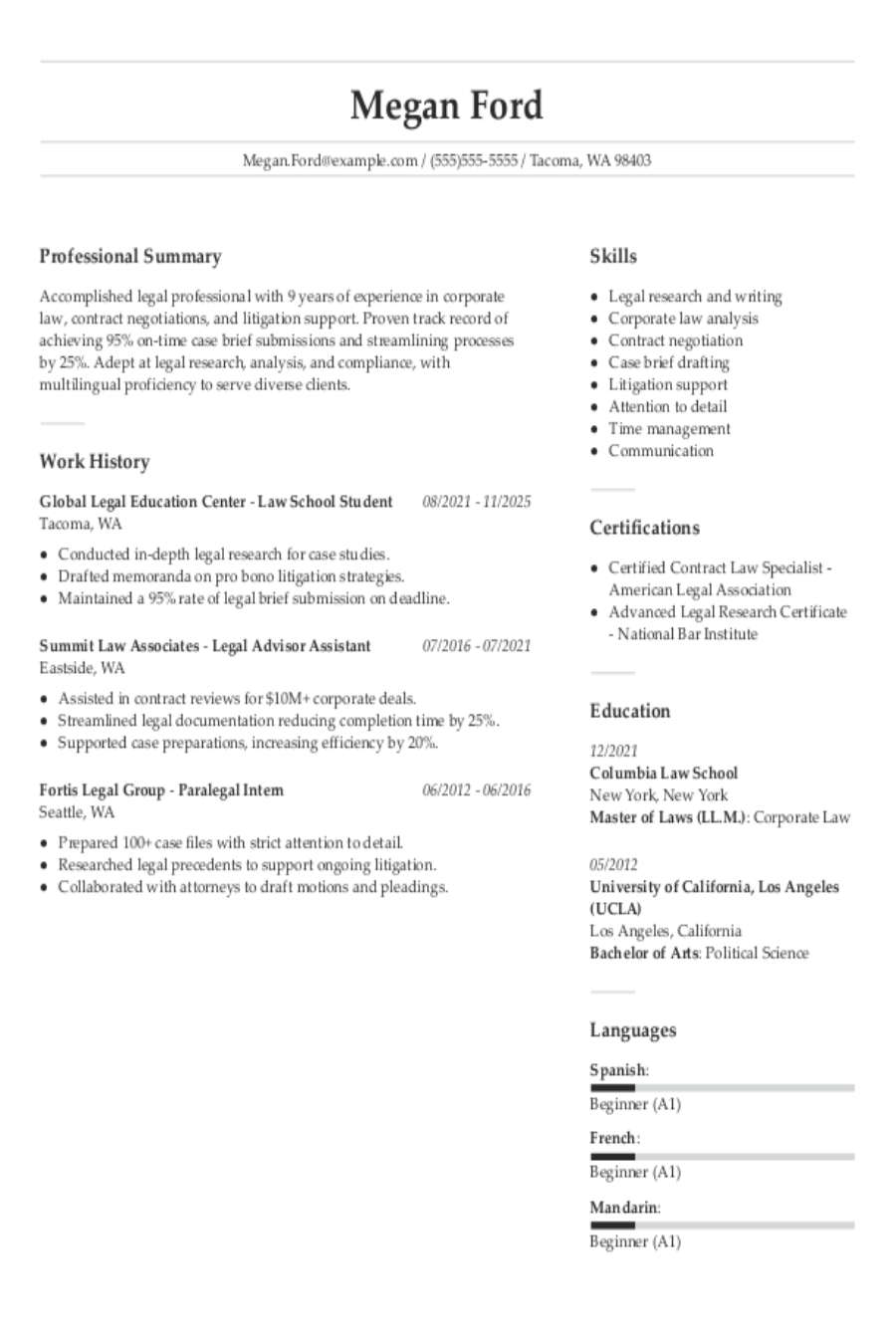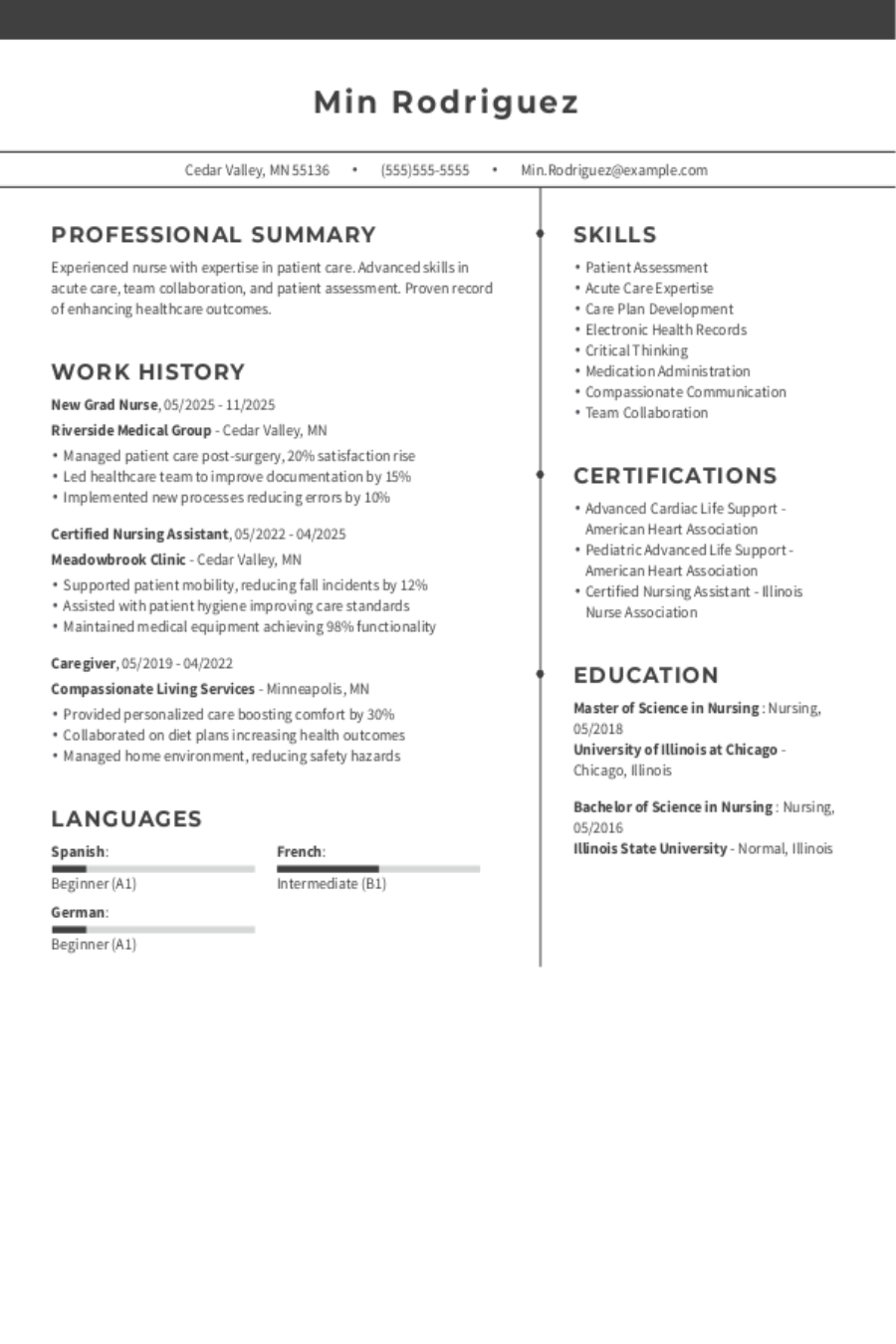Popular Freelance Writer Resume Examples
Entry-level freelance writer resume
An entry-level resume for a freelance writer should focus on showcasing writing samples, relevant coursework, internships, and skills like adaptability, creativity, and strong communication to attract potential clients.
Showcases education: This resume effectively highlights the candidate's writing expertise by placing their education near the top of the document.
Places skills over experience: The functional resume format is strategic for this freelance writer because it highlights key skills such as SEO content creation and copywriting, showcasing relevant accomplishments instead of focusing on chronological work history.
Mid-career freelance writer resume
A mid-career freelance writer's resume should emphasize diverse writing experience, honed skills across various platforms, and growth through continuous learning and client collaboration.
Encourages quick scanning: A clean layout and thoughtful organization allow hiring managers to effortlessly identify key qualifications, showcasing the applicant's extensive experience and achievements in freelance writing.
Employs active language: Using action verbs like "crafted," "improved," and "collaborated" illustrates a proactive approach and significant achievements in the freelance writing field.
Experienced freelance writer resume
An experienced freelance writer's resume should highlight key writing projects, relevant skills, and a clear progression in their creative portfolio to demonstrate growth and expertise.
Quantifies achievements: Quantifiable achievements offer a clear picture of your impact as a freelance writer. By showcasing specific metrics, such as increased engagement rates or the number of articles produced, you help recruiters easily recognize your contributions and effectiveness.
Highlights experience: The resume opens with a compelling summary that showcases the applicant's 12 years of experience in freelance writing. This introduction effectively establishes their expertise and sets a professional tone for the entire document.
No experience freelance writer resume
A resume for an applicant with no experience should emphasize relevant skills, volunteer work, and educational achievements to demonstrate the job seeker's potential and enthusiasm for the freelance writing position.
Draws from diverse experiences: Incorporating volunteer writing and community engagement experiences improves a resume by showcasing practical skills and commitment to communication, which are often highlighted through extracurricular activities rather than formal job history.
Overcomes lack of work history: Emphasizing strong writing and editing skills highlights the job seeker's readiness for freelance opportunities, showcasing their ability to produce engaging content despite limited formal experience.
More resume examples
Freelance Writer Resume Template
Looking for a way to showcase your skills? This freelance writer resume template offers a solid base to personalize with your unique experience and achievements.
Sophia Singh
Los Angeles, CA 90008
(555)555-5555
Sophia.Singh@example.com
Professional Summary
Accomplished freelance writer specializing in SEO-optimized content, boosting engagement and brand visibility by 30%. Proven track record in creative copywriting and storytelling for diverse projects.
Work History
Freelance Writer
Prose Solutions - Los Angeles, CA
February 2024 - September 2025
- Composed 10+ monthly articles for online publications
- Improved reader engagement by 25% through SEO strategy
- Developed original copy for marketing campaigns
Content Strategist
Writeloft Media - Riverside, CA
February 2022 - January 2023
- Increased web traffic by 30% with optimized content
- Managed team projects, hitting 90% deadlines on time
- Created 50+ blog posts surpassing target engagement
Creative Copywriter
Innovate Writing Hub - Lakeside, CA
February 2021 - January 2022
- Led creative writing team in bespoke campaigns
- Won two national writing awards with impactful content
- Enhanced client brand visibility by 20% through narrative
Skills
- SEO Optimization
- Content Creation
- Copywriting
- Storytelling
- Editorial Strategy
- Project Management
- Brand Development
- Digital Marketing
Certifications
- Certified Content Marketing Specialist - Content Marketing Institute
- SEO Professional Certification - SEO Association
Education
Master of Arts English Literature
University of Texas at Austin Austin, Texas
May 2021
Bachelor of Arts Journalism
Texas A&M University College Station, Texas
May 2019
Languages
- Spanish - Beginner (A1)
- French - Beginner (A1)
- German - Beginner (A1)
Writing Your Freelance Writer Resume
Having explored these impressive freelance writer profiles, you're now prepared to dive into the process of crafting your own. We'll guide you step by step through each section, ensuring you understand how to write a resume that stands out.
List your most relevant skills
An effective skills section for your freelance writer resume should focus on including both hard skills, such as SEO optimization and content creation, and soft skills like creativity and time management. This demonstrates not only your technical prowess but also your ability to meet deadlines and adapt to client needs.
When crafting this section, make sure to reference keywords from the job listing. By integrating these specific terms, you improve your visibility with applicant tracking systems while also resonating with human recruiters.
Example of skills on a freelance writer resume
- Proficient in researching diverse topics to create compelling content
- Adept at adapting writing style to different audiences and platforms
- Strong communicator with a knack for collaboration and feedback
- Careful editor with an eye for detail and grammar
Your skills section should clearly demonstrate your readiness for freelance writing opportunities. Include specific technical skills related to writing and research, along with essential soft skills like communication and adaptability. This balanced approach showcases your comprehensive preparation for the role and appeals to potential clients.
Highlight your work history
As a freelance writer, your work experience section is pivotal to showcasing not just the breadth of your projects but also the impact you’ve made through your writing. Demonstrate how you've brought value to clients with specific examples, such as increasing readership or improving brand voice through targeted content strategies.
When detailing each project or role, be sure to include key information such as your role title, client or publication name, and the dates you contributed. This establishes a timeline of your expertise and reliability as a professional freelancer. Including these details allows potential clients or employers to easily verify the scope of your experience.
Example of a freelance writer work experience entry
- Freelance Writer
Self-Employed - Remote
January 2021 - Present - Craft engaging content for diverse clients, including blog posts, articles, and marketing materials, resulting in a 30% increase in client engagement
- Conduct thorough research to ensure accuracy and depth of information across various topics, maintaining high standards of quality and reliability
- Use SEO best practices to improve online visibility of written content, contributing to an average 25% growth in organic traffic for client websites
- Collaborate with graphic designers and marketing teams to develop cohesive campaigns that effectively convey brand messages and drive customer interest
- Manage multiple projects simultaneously while meeting strict deadlines, ensuring timely delivery without compromising quality
Highlighting outcomes and achievements in your experience section showcases your contributions in a meaningful way. By illustrating how you've positively impacted projects or met goals, you capture the attention of potential employers. This approach not only reflects your skills but also demonstrates your proactive nature, making you a more compelling job seeker in the competitive freelance writing market.
Add portfolio work to your resume
For freelance writers, showcasing your work effectively on your resume while encouraging employers to view your portfolio is a balancing act. Highlighting relevant writing samples can demonstrate your versatility and style without cluttering the document.
Place a link to your portfolio prominently at the top of your resume, right under your contact information. Consider adding a "Featured Works" section where you summarize 3-4 standout pieces with brief descriptions that capture their essence and impact.
Example of a portfolio highlights section
- Blog Content Strategy for Travel Adventures – Developed engaging articles that boosted website traffic by 50%
- Social Media Campaign for Eco-Friendly Products – Crafted compelling posts resulting in a 35% increase in follower engagement
- E-book Writing for Health Innovations – Authored an informative guide recognized as a top resource by industry professionals
- Copywriting for Local Restaurants – Created menu descriptions that improved customer experience and increased sales by 20%
Include your education
The education section of your freelance writer resume should list your degrees and diplomas in reverse-chronological order, starting with the most recent. Include any relevant coursework, but you can omit your high school diploma if you have a higher qualification. Highlighting honors or certifications that pertain to writing can also improve this section.
If you are currently enrolled in a program or have not completed your degree, it is important to indicate your highest completed level and include an expected graduation date. Consider adding bullet points that outline key courses or projects that showcase your writing skills.
Common certifications for a freelance writer resume
- Certified Professional Writer (CPW) – Association of Professional Writers (APW)
- Freelance Writing Certification (FWC) – Freelancers Union
- Content Marketing Certified (CMC) – HubSpot Academy
- SEO Copywriting Certification (SCC) – American Writers & Artists Institute
Sum up your resume with an introduction
A strong profile section on your resume is essential for making a lasting first impression. It serves as your elevator pitch, allowing you to present yourself succinctly and compellingly to potential employers. This is where you can set the tone for the rest of your application by highlighting what makes you unique and qualified for the paralegal role.
For experienced job seekers, a professional summary is the most effective choice. It allows you to showcase significant accomplishments and relevant skills right at the top of your resume. If you’re just starting your freelance writing career, write a resume objective that focuses on your goals and long-term development.
Professional summary example
Versatile freelance writer with over 5 years of experience crafting compelling content across various platforms. Demonstrated ability to engage audiences through persuasive storytelling, SEO optimization, and careful research. Highly proficient in adapting tone and style to meet client needs while consistently delivering high-quality work on tight deadlines.
Resume objective example
Enthusiastic freelance writer eager to use strong creativity, research abilities, and adaptability to produce engaging content for diverse clients. Committed to delivering high-quality work that meets client expectations while contributing fresh ideas and perspectives to improve brand storytelling.
As a freelance writer, you should ensure your resume profile is concise and packed with essential information. Aim for no more than three sentences that highlight your key skills and experiences. Save any additional details for your cover letter, where you can further expand on your qualifications.
Add unique sections to set you apart
Including optional resume sections can set you apart as a freelance writer by showcasing your unique qualifications. These sections allow you to highlight skills and experiences that aren't captured in traditional formats.
You can reveal various aspects of your professional journey through relevant hobbies and volunteer work. For instance, if you contribute to a local magazine or blog, it reflects your commitment to writing outside of paid engagements. Sharing these experiences emphasizes not only your skillset but also personal values that resonate with potential clients. This holistic view can make all the difference in securing new opportunities.
Three sections perfect for a freelance writer resume
- Work Samples: Including a portfolio section in your creative resume is essential for a freelance writer. Showcase 3-5 standout pieces that reflect your style and versatility, providing potential clients with a glimpse into your writing skills and unique voice.
- Client Testimonials: Incorporating client testimonials into your resume can set you apart in a creative field. Short, strong quotes that showcase your creativity and dedication can leave a lasting impression on potential employers.
- Awards and Recognition: Showcasing awards to your resume improves your credibility. Include any relevant honors, industry accolades, or special mentions along with the issuing body and date to highlight your achievements effectively.
5 Resume Formatting Tips
- Choose a format that matches your career stage.
Choosing the right resume format is important for effectively showcasing your skills. If you’re an experienced freelancer, a chronological format highlights your career progression. For those just starting out, a functional resume can emphasize relevant skills over work history. Consider a combination format to showcase both aspects.
- Pick a smart resume template.
Using a professional resume template can significantly improve the readability of your document. A well-structured layout highlights your key achievements, making it easier for hiring managers to quickly grasp your qualifications. If you choose a custom format, ensure it stays clean and incorporates fonts compatible with applicant tracking systems.
- Select an appropriate font.
Opt for clean and professional font styles to improve your resume's readability. Fonts such as Helvetica, Georgia, or Verdana are great options that provide clarity for both ATS systems and hiring managers.
- Use consistent formatting.
Align your resume to the left and maintain uniform margins. This creates a polished, professional look that improves readability and leaves a strong impression.
- Keep your resume to one or two pages.
When crafting your resume, remember that resumes should be one page long unless you have extensive experience to showcase. Keep your content concise and focused on the key achievements that highlight your qualifications.
Tools for Your Job Search
Are you ready to submit your application for that freelance writing gig you've been eyeing? Before you hit send, consider using our ATS Resume Checker. This tool will give you valuable insights into how your resume performs with the automated systems that many companies use to screen applicants.
Looking for a way to elevate your resume? Our AI Resume Builder offers tailored recommendations specifically designed for freelance writers, along with professionally crafted templates that effectively showcase your writing skills and portfolio.
Frequently Asked Questions
Last Updated: October 3, 2025
Yes, a cover letter is important because it provides context to your resume and creates valuable communication opportunities with potential employers. It’s your chance to convey your passion for the freelance writing role and demonstrate how your unique skills make you an excellent fit. So, take the time to write a cover letter that truly reflects who you are.
If you're looking for a quick solution, try our AI Cover Letter Generator! It allows you to create a tailored cover letter in just minutes. Plus, you'll find various cover letter template options that perfectly match your resume, ensuring a polished and professional presentation of your work.
A resume is a concise document, usually limited to one or two pages, highlighting your skills and work experience in a straightforward manner. In contrast, a curriculum vitae (CV) is more comprehensive and can span several pages, detailing your academic background, research contributions, publications, and professional experiences extensively.
You should use a CV when applying for specialized positions in academia, science, law, or medicine. If you're unsure about how to create an effective CV, our online CV Maker can assist you. With various CV templates tailored for different industries and career levels, you'll be able to craft a standout CV quickly and efficiently.
A freelance writer's resume should ideally be one page long, showcasing your skills and experience effectively. However, if you have extensive experience or diverse qualifications, a two-page resume may be appropriate to capture all relevant details.
Selecting the right resume format hinges on your experience and skill set. For those just starting out, a functional format highlights relevant skills over work history. Conversely, seasoned professionals should opt for a chronological format that showcases their extensive experience. Mid-level job seekers can benefit from a combination format, allowing them to display both their skills and professional journey effectively, striking a balance that appeals to potential employers.
To tailor your freelance writer resume effectively, focus on highlighting the skills that match the job description. Review the listings carefully to pinpoint keywords and phrases that resonate with your experience. Incorporating these terms will help demonstrate your suitability for the role and improve your chances of standing out.
To thrive as a freelance writer, continuously improve your skills through online courses and writing workshops. Consider joining writers" groups to network and share insights. Keep up with industry trends by reading relevant blogs and publications. This proactive approach will showcase your commitment to professional growth.
Was this information helpful? Let us know!
Leisha is a career industry editor dedicated to helping job seekers excel in their careers.
More resources

Summary of Qualifications: 13 Examples for Your Resume
Our guide will help you write a summary of qualifications that...

How to Write a Cover Letter in 2025
A great cover letter will impress employers and get you hired....

Cost of Living Crunch: 92% of Americans Cut Back Spending in 2025
Resume Now s survey reveals a cost of living crisis that has l...

Mechanical Engineering Resume: Examples & Templates
As a mechanical engineer you need a resume that showcases you...

Law School Resume: Examples, Templates and Tips
Creating a standout law school resume means highlighting criti...

New Grad Nurse Resume: Examples & Templates for 2025
As a new grad nurse you need a resume that highlights your cl...

